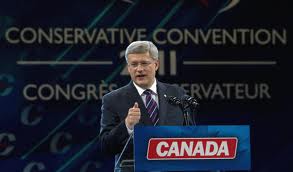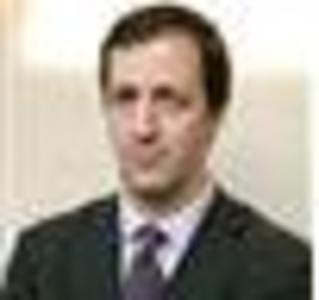If there is one image that defines last week’s Conservative convention, it is surely that of a closed door. For much of the convention, that was all reporters were permitted to see of it.
Indeed, most of Calgary’s BMO Centre was off limits. If you stood in the foyer, you could just catch a glimpse of delegates milling about inside, protected as by a cordon sanitaire from the filth that waited for them, pen in hand, without. That is, you could, until you were ordered out of the foyer.
It was all part of the weird, unsettling vibe that hung over the whole event. (We’ve grown used to seeing prime ministers sealed inside an impenetrable bubble, but a whole party?) That reporters were constrained from doing their jobs is perhaps a side issue. But that a democratic political party, at its national convention, would go to such lengths to hide from public view is just a bit creepy.
In the end it didn’t succeed in preventing reporters from talking to delegates, who were on the whole the kind of decent, public-spirited folks you find at any such gathering. I doubt that was really the point. It was, rather, a deliberate thumb in the eye to the media, part of a larger us-and-them message the party leadership likes to impress upon its members at every turn. (See, in the same vein, the prime minister’s defiantly small-minded address to the convention, with its lengthy list of hissable targets: Liberals, New Democrats, criminals, the courts, Ottawa elites, senators, criminals, foreign capitals, criminals…)
But the impression was that of a party closing in on itself, of a leadership that accepts no blame for the depths into which the party has sunk, but that sees itself as wholly the victim of outside enemies. As a short-term strategy for preserving internal unity, this has its uses. The problem is that the list of enemies keeps growing, and as it grows, starts to include more and more of the party’s staunchest supporters. Some of the prime minister’s closest confidants and advisers are now on the list, from Tom Flanagan to — the scapegoat of the month — Nigel Wright.
Add to the list of the excommunicated, also, commentators of such unimpeachably conservative character as Tasha Kheiriddin (former president of the Progressive Conservative Youth Federation) or Sun Media’s John Robson, who have become increasingly agitated by the direction the party has taken under its current leadership. In time, the list will surely also have to include Jason Kenney and Peter MacKay. It may already.
Consider how fully the prime minister has invested in the notion that the infamous cash-and-coverup deal with Sen. Mike Duffy was all Wright’s doing. Indeed, the broader the circle of people around the prime minister who, as it has emerged, knew of, if not participated in, the scheme, the more frenetic the blame-Nigel campaign has become. He didn’t just act alone, without the prime minister’s knowledge: he deceived him.
And just as that was in full swing, along come two of his senior ministers to say what a capital fellow Wright is: an “extraordinarily capable man with high ethical principles,” a “friend,” guilty of nothing more than an error of judgment. (To be fair, that was the prime minister’s position at one point, somewhere between “I have full confidence in him” and “I dismissed him.”) Under the circumstances, how can this be interpreted as anything but another betrayal?
So when, at the end of the convention, the chairman of the Conservative Fund Canada, Sen. Irving Gerstein, appeared before delegates to inform them, inter alia, that he “made it absolutely clear to Nigel Wright that the Conservative Fund would not pay for Sen Duffy’s disputed expenses, and it never did,” it was equally hard to see this as anything but a swift kick at ministers Kenney and MacKay.
Consider. What Sen. Gerstein was implying, even if he did not quite say it, was that when Wright told the RCMP, through his lawyers, that the party had in fact been quite prepared to pay Sen. Duffy’s expenses — until it saw the size of the bill — he was lying. While it’s possible to parse his words in such a way that they do not conflict with Wright’s, the plain import is that they do. The contradiction, what is more, could not be put down to a mere misunderstanding: he had made it “absolutely clear to” Wright.
This rather ups the ante, not just for Wright (his lawyer acidly replied that Wright would not respond “at this time to this latest characterization of events”) but for his two ministerial defenders. Can they continue to stand behind a man accused by the party’s chief fundraiser of lying to the cops? Whose version of events do they accept: Wright’s or Gerstein’s?
But Gerstein may have put himself in jeopardy at the same time. For even as he was contradicting Wright on one point, he was confirming him on another: that he was one of the those who knew of the efforts to pay off Duffy’s expenses. And if he knew, and did not tell the prime minister, how is he not part of the same circle of deception?
Thus the Conservative tragedy grinds on. When your only principle is paranoia — when your central organizing proposition is that “everyone is out to get us” — when every criticism is merely confirmation of the essential rightness of that proposition, and every deviation is evidence of disloyalty, then you are less a party than a cult.
I don’t say that is what the party has become. But it is an early warning sign in any group when its members are required to cut themselves off from the outside world.
Andrew Coyne: Conservatives’ closed door convention doesn’t win them any new friends






























Laissez un commentaire Votre adresse courriel ne sera pas publiée.
Veuillez vous connecter afin de laisser un commentaire.
Aucun commentaire trouvé